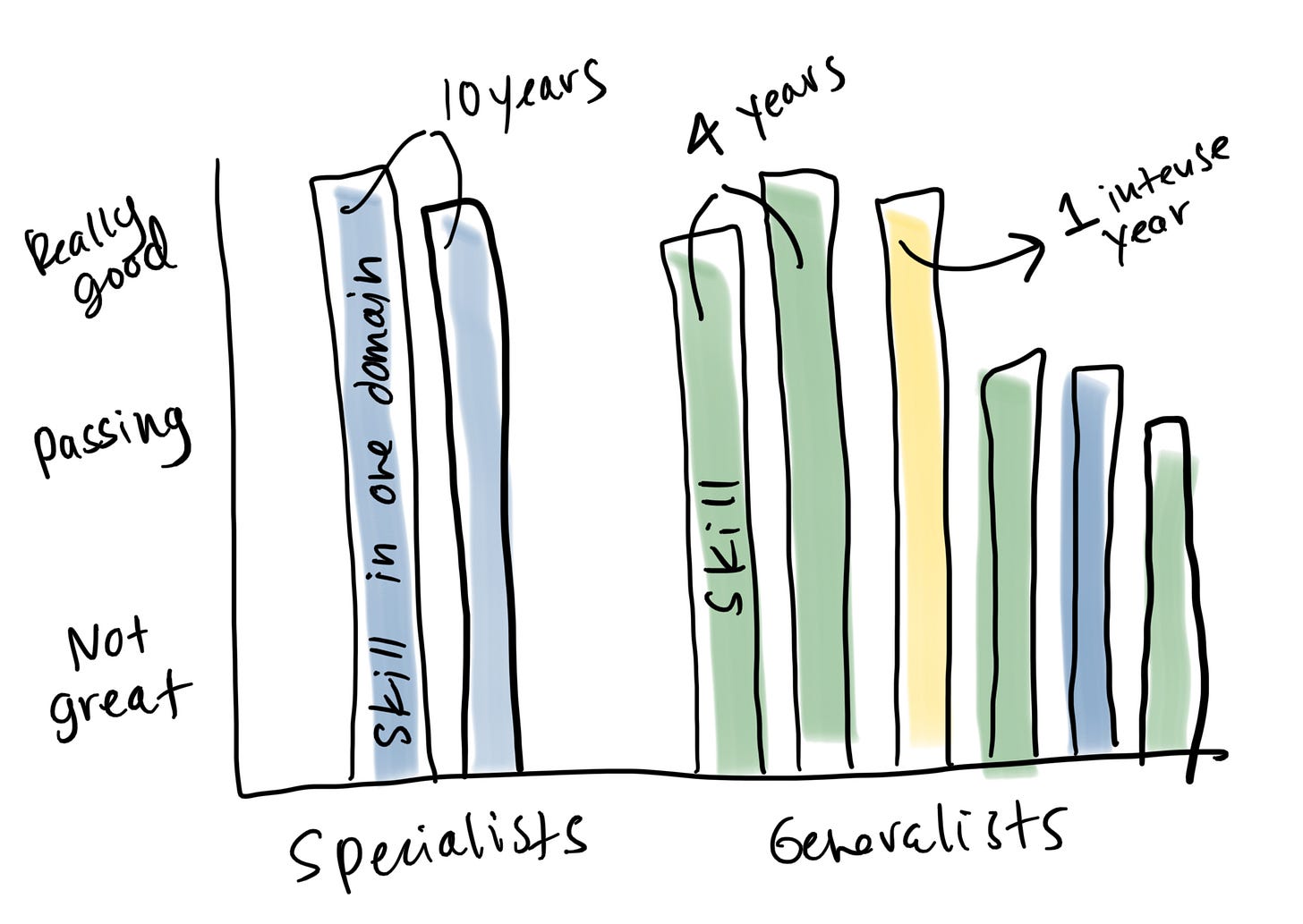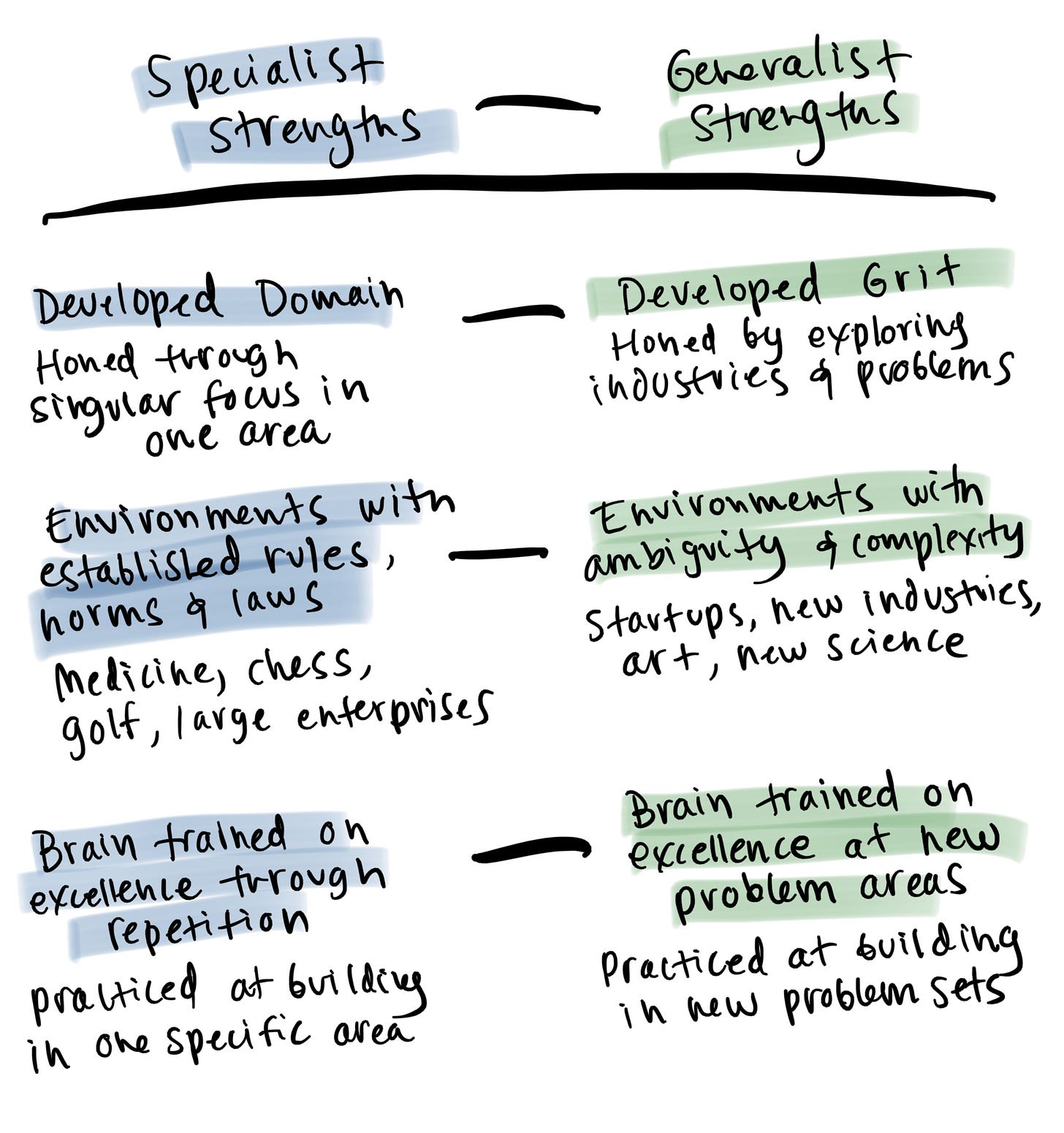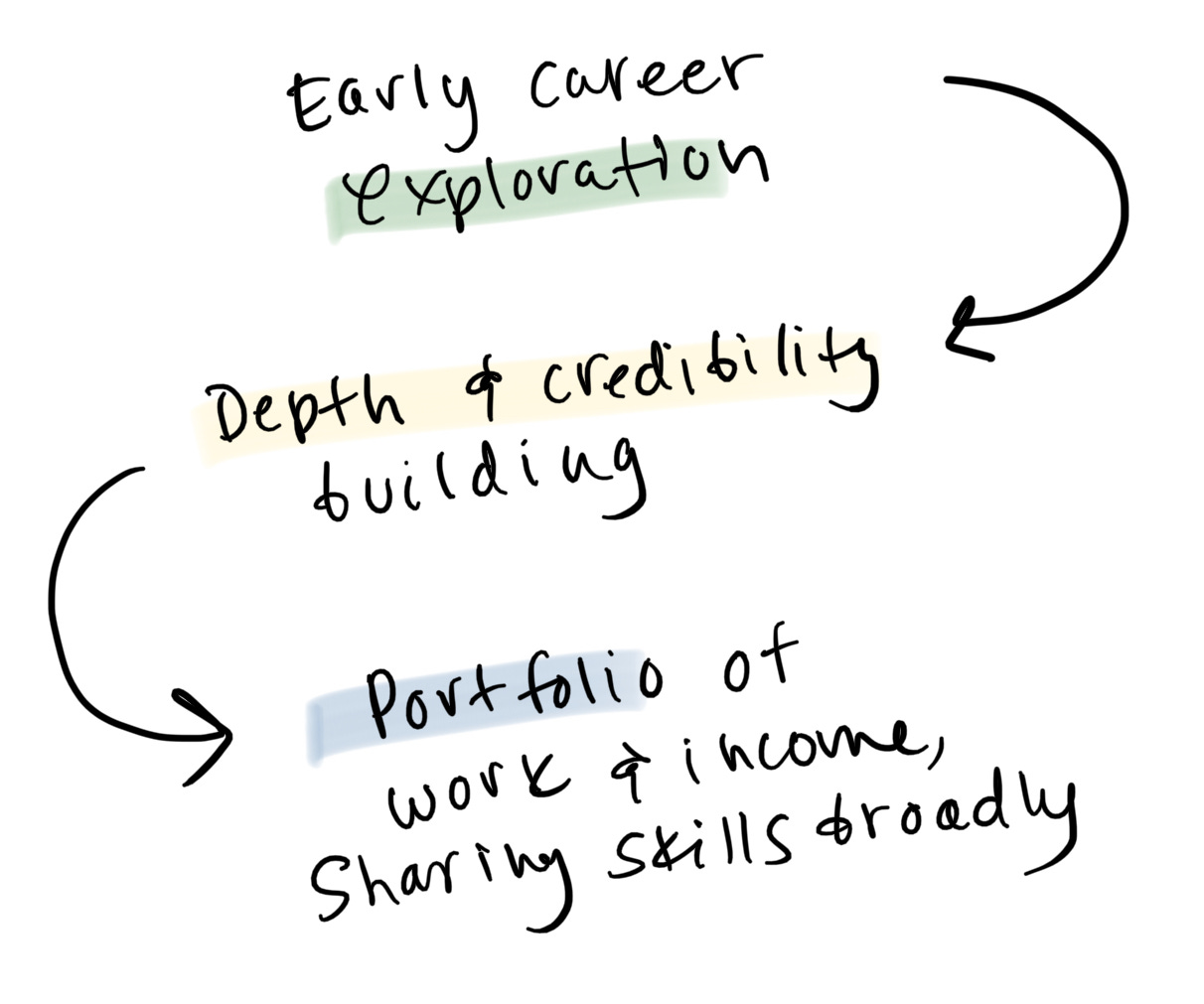Big Idea #2: The High Value Generalist
When you're top 5% at multiple skills, you get to do whatever you want
Welcome back to part 3 of this 4 part series on the Big Ideas behind Hello Generalist and this phase of work. You can read the intro here, and the deep dive into Big Idea #1: the Rise of Fractional Work, here.
Wrapping up the series next week, I’ll finish with the third Big Idea: how more and more crazy talented tech workers are building Portfolio Careers with many projects and income streams. I hope you’ll read along, and I hope you’ll keep sharing feedback as it helps fine tune these ideas even more.
First, some shameless plugs. If you’re into the ideas I write on, here’s a few ways for us to work together:
Are you a startup who’s curious about fractional hiring? Check out Hello Generalist, or book a call with me here.
Are you a startup operations pro who wants to join HG’s network of fractional operators? We’re on a waitlist at the moment, but we welcome your application.
Want 1:1 time with me to talk about building your fractional work practice or portfolio career? I’ll show up judgement free and candid, and make this hour a super valuable one for you. You can book that here.
Alright, let’s get into it.
The Second Big Idea: The High Value Generalist
Two concepts to break down inside of this Big Idea: Generalist, and High Value
The Generalist bit
The old way of thinking is that being a Generalist means you’re not actually great at anything. That you dabble in a variety of things without ever building expertise. It’s the outdated Jack of all trades, master of none that lands here.
In this old world, you were encouraged to pick a singular domain in high school or college, and pursue that solely and without distraction for your whole career. They’d say, if you do that, you’ll be successful. You’ll have job stability. You’ll be competitive. Look at Tiger Woods, they’d say — he started playing golf at two years old, and became the greatest player in the world.
We love the old Specialist story. It’s so satisfying! You pick a thing, you go to college for it, you get to doing it, you make the money, buy the house, do the thing some more. Life! Career! Ta da!
But of course, we don’t live in that world anymore.
In today’s professional world (tech, in particular), the rules are changing all the time. Success, let alone innovation, requires meaningful adaptability. Unlike Tiger’s game of golf, where the rules are posted on the wall, most work today doesn’t have preset rules.
After 10 years of burgeoning-generalist-anxiety of my own, my big a-ha came inside of David Epstein’s excellent book, Range. He studies the most successful people in the world, and challenges this old story that in order to be successful, you have to follow the Tiger’s path. Instead, his research finds that most of our prolific artists, scientists, and business leaders collected a variety of skills across domains early on before settling into their area of expertise — that they were prolific because of the exploration and breadth, not in spite of it.

As a Generalist explores new industries, roles, and skills, they quite literally train their neurons on solving problems, on making connections between seemingly disparate concepts, and on extreme adaptability.
This practice makes Generalists particularly good at working in environments with ambiguity and complexities. While a Specialist’s brain thrives in environments with preset rules order, like law, medicine, and finance, a Generalist excels inside startups, new industries, science, and art. Epstein refers to them as Kind Environments (the ones with the rules), and Wicked Environments (the ones without).
Nothing like recognizing yourself in a great book.
Important to say that this is not meant to be anti-specialist. Just the opposite! We need all kinds to make this world work. My own wiring meant I would never have gone to Med School or Law School, but wow, am I glad my friends did. Likewise, I didn’t last long in a large corporation, but genuinely appreciate my friends who have.
These new definitions of Generalist and Specialist aren’t about expertise — many Generalists have expertise, and many Specialists enjoy learning new things. Instead, I like to think that it’s about someone’s approach, mindset, and the environments where their brain has a natural advantage. Being a Generalist is no longer a matter of being a Jack of all trades, master of none — it’s about having a diverse skill set, deep expertise in multiple areas, and the ability to navigate ambiguity with confidence.
So that’s a Generalist, the first part of this Big Idea.
The High Value bit
Put simply, a High Value Generalist is someone who’s developed top 5% skills in 3 or more areas, and is bolstered by a long tail of other meaningful skills.
Said another way, they found specialization not from a choice they made at 18 years old, but instead after intentionally trying a variety of other skills and domains along the way. They discovered the thing that they’re uniquely good at. And they arrive at that expertise with all the critical Generalist traits from above: practiced grit and adaptability, ability to succeed with ambiguity and complexity, ability to draw connections between unrelated areas.
Their expertise gives them credibility and a marketable edge, and their Generalist traits that got them there give tenacity to operate broadly. Pretty cool.
On a resume, this is easy to spot.
Imagine this path on a timeline: Your 20s were explorative across problems, roles, or industries. Maybe you traveled a bit. Maybe you tried roles across a few departments. Maybe you started a company that didn’t go too far.
But then, sometime in your late 20s or early 30s, you landed a role where you went deep, built credibility, and became truly excellent at a few particular things — maybe you joined a rocket ship startup early on and grew with them, or perhaps you held a few big roles at a well known company, or maybe you built a successful company or product.
And you emerge mid career with credibility, marketable skills, and the internal wiring of someone who’s brain was trained on the figure-it-outedness along the way.
Importantly, the second chapter on your resume wasn’t a path of average achievement — you got truly excellent. There are many Generalists who good at certain skills. Really good even. But to me, The High Value Generalist has developed deeply competitive, adept, top 5% skills.
In today’s world, particularly for startups, these people are incredibly valuable.
Why High Value Generalists are working for themselves
The old way of thinking is that once you're exceptional at what you do, the best way to make a ton of money and have a ton of impact is to go deep with one company. I still think that's great for some.
But, thank you internet / post-Covid panic / layoff insanity, a growing number of High Value Generalists are leaving the comforts of full-time work to do their own thing instead. If you can crack it, it means higher potential income, and more time spent on your schedule (not someone else's). Your impact goes from one company, in one industry, in one role, to impact on a much wider plane. Plus, it’s just fun to use all the tools that you’ve slotted into your tool belt.
The trade off is pretty clear.
An interesting thought I hear all the time from Hello Generalist members us that their early career exploration also seeded the confidence and risk taking mindset that they rely on now as they start to work independently. Armed with proof that they’re among the best at what they do, and the proof that they can switch gears if working for themselves goes to hell. I love this.
Let’s look at a couple well known internet people who I think illustrate the story:
Wes Kao: Early career roles across branding, digital marketing, and as a business analyst. Developed breakout credibility in online cohort based courses as she met Seth Godin and started AltMBA, later co-founding Maven. Now works independently as a coach, startup advisor, and online course instructor.
Lenny Rachinsky: Early career in a variety of coding and web development roles. Founded a startup which Airbnb acquired, leading to his breakout and depth-building role in Product Management with them. Now works independently writing a Substack, hosting a podcast, teaching an online course, angel investing, and advising startups.
Janel Abrahami: Early career in BD, tech recruitment, and TV talent development. Broke out with a breadth of HR roles inside Tinder, Mind Gym, and Stitch Fix. Now works independently as a career coach, speaker, newsletter author, and TikTok-er.
And a few Hello Generalist members:
Harry Siggins: Early career as an energy analyst and strategy consultant before a breakout role joining Quantive early and working as their Chief of Staff for nearly 5 years. Today, he coaches Chiefs of Staff, does fractional operations work with startups, and leads OKR workshops.
Kel Rakowski: Early career as Photo Director for Metropolis magazine, cofounding a textile design studio working with Urban Outfitters, and doing book design for Todd Oldham Studio. Broke out as the Founder of Lex and herstory, and today works fractionally with early stage teams and founders, writes online, and is starting a zine.
Danoosh Kapadia: Early career as a heavy machinery application engineer before finding breakout roles as the first Sales hire at General Assembly and as BD Lead at IDEO U. Now, he works independently as a fractional growth advisor to startups, and creating coursework on how to adopt AI.
I’m in this group too. Early career, I worked in the food space, helping to open a food truck, and going on tour with Outstanding in the Field. I also studied classical music and worked inside several arts nonprofits. My depth building came as I joined Chewse during their Seed round, building B2B marketplace operations through our Series B acquisition, and then joining Yelp as a National GM and Chief of Staff.
And today, my portfolio makes good on the B2B marketplace expertise, including Hello Generalist, coaching startup ops execs, and fractional ops work with startups.
To put a bow on this whole thing: The definition of a Generalist has shifted. It’s no longer a matter of being a Jack of all trades, master of none —it’s about having a diverse skill set, deep expertise in multiple areas, and the ability to navigate ambiguity with confidence. The High Value Generalist proves that breadth and adaptability are not just valuable — they're essential for startups.
And what’s wonderful is that the future of work isn’t one-size-fits-all. Generalists get to leverage their skills to maximize freedom and impact. And for startups, it’s about embracing this shift — because the best talent isn’t just looking for a job, they’re looking for meaningful work, on their own terms.
—
Next week, I’ll wrap up with the final deep dive on the last Big Idea: What are Portfolio Careers, and why this group are building them. I hope you’ll read along, and I hope you’ll share your feedback as it helps fine tune these ideas even more.
If you want to go deeper into the ideas from today’s post, here’s a glimpse into what I’ve been reading, watching, and listing to this week.
To dive more into David Epstein’s book Range, his TED Talk is a great start. I also like the book summaries from both IDEO U and John Eden.
Molly Graham’s post, There’s no such thing as a Generalist, is the obvious counterpoint to this. I thinks she misses the mark, but we do make many of the same points 🤷♀️
Be well! Until next week, Shaina










Loved this breakdown. Was exactly my story. Explored the marketing world and got a masters in the 6 years after graduating undergrad. Started my career in tech at General Assembly running part time programs (probably overlapped with Danoosh) and became a VP 5 years later. Then spent the next 5 years in Ops roles in Edtech across Product/Tech and on the business side. Now I run my own coaching company, specifically for high achievers. Got my first client the day after I put up my website and haven't looked back since.
I absolutely LOVE this. FINALLY, someone who understands me.